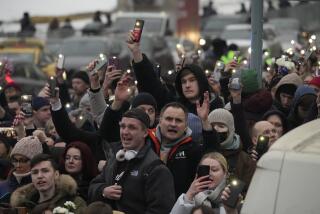Russia’s Banned Opposition Vows to Contest Elections : Politics: Its parties and newspapers have been closed down. If this continues, says one anti-Yeltsin leader, the balloting will be ‘a farce.’
MOSCOW — Their parties have been banned and their newspapers closed down, but two leaders of the opposition to Russian President Boris N. Yeltsin vowed on Tuesday that they will not just hand him upcoming elections.
“We do not plan to distance ourselves from the elections,” hard-line lawmaker Sergei N. Baburin told an impromptu crush of reporters after a formal news conference had been canceled at the Yeltsin administration’s request.
But if Yeltsin does not let the opposition parties and press function legally, “I don’t believe in any free elections--it will be a farce,” said Baburin, leader of the Russian Unity faction in the dissolved Parliament.
The parliamentary elections, scheduled for Dec. 12, are quickly becoming the focus of the Russian political scene in the wake of the violence last week that left scores dead. Commentators see new elections as the only way to restore legitimate power in Russia after Yeltsin and the Parliament set out to destroy each other.
An adviser said Tuesday that Yeltsin may even decide to call presidential elections at the same time as the balloting for Parliament, possibly moving both elections to March. Earlier, Yeltsin had insisted that he would not call presidential elections before next summer.
“Simultaneous elections will confirm Yeltsin’s orientation toward continuing democratic transformation,” Georgy Satarov, a member of Yeltsin’s advisory council, told the Itar-Tass news agency.
He said he thought it likely that Yeltsin will go along with advice from council members to hold early presidential elections. Yeltsin is expected to announce his decision later this week after he returns from Japan.
Meanwhile, with only two months left before the December balloting, Russia’s political parties and election officials were launching frantic preparations.
Yeltsin decreed this week that elections will also be held for the new Russian Parliament’s upper chamber, to be known as the Federation Council. Previously, he had planned to give the Federation Council over to regional leaders who would be given seats.
As plans now stand for the new Parliament, which will be called the Federal Assembly, it will look much like the U.S. Congress, with the upper chamber consisting of two senator-types from each region and the lower chamber, known as the State Duma, consisting of 450 members elected more proportionally.
Parties are beginning to register and set up election headquarters across Russia. Russian media speculate that pro-Yeltsin parties have the most support, but no pre-election polling has begun.
Vladimir V. Zhirinovsky, the most prominent Russian fascist, told the Interfax news agency that he thought his Liberal Democratic party could garner 30% in the elections. He won 7% of the vote in presidential elections in 1991 in a striking sign of right-wing fervor.
Zhirinovsky’s party remains legal because he took no part in last week’s violence around the Russian White House and the Ostankino television complex. Yeltsin has banned a slew of other groups implicated in the fighting as well as the press that supports them.
The news conference at the International Press Center at which Baburin was to speak was canceled because Yeltsin’s administration had asked for it to be postponed until emergency rule ends, Baburin said. But he and Gennady A. Zyuganov, leader of the banned Communist Party of the Russian Federation, swore that the opposition will continue to fight despite such setbacks.
“You can’t call them elections when one set of hands holds everything--means, money, control, law and executive power,” Zyuganov said. “That’s not elections.”
More to Read
Sign up for Essential California
The most important California stories and recommendations in your inbox every morning.
You may occasionally receive promotional content from the Los Angeles Times.










